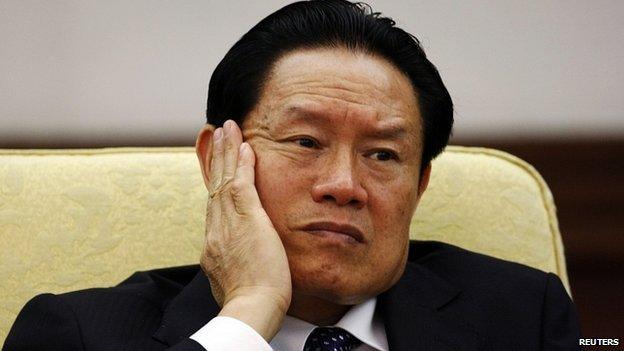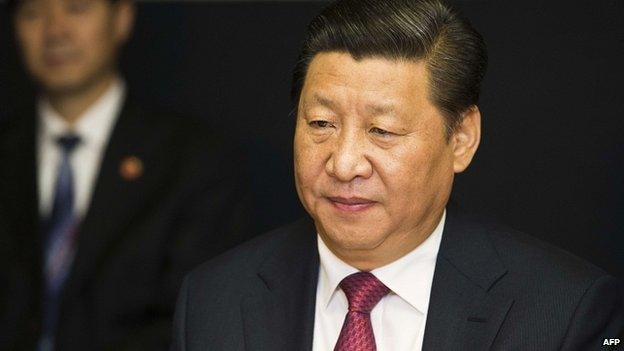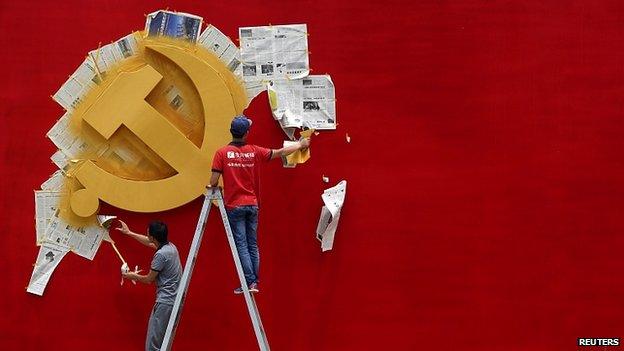Xi cages big tiger in anti-corruption drive
- Published

Few will shed tears over the arrest of former Chinese security chief Zhou Yongkang
There were some who doubted that Xi Jinping had the nerve or the power to push this to a criminal trial.
China's president has answered them - and fast. A little over four months from the announcement of the party's internal investigation into Zhou Yongkang to criminal proceedings now.
Only this week, President Barack Obama was telling business leaders in Washington that Xi Jinping had consolidated power faster than any Chinese leader since Deng Xiaoping three decades ago. The arrest of Zhou Yongkang is another demonstration of how comprehensively Xi has taken control at the top of the party.
As the man who once led China's enormous internal security apparatus, Mr Zhou was long seen as invulnerable. But he will now become the most senior official in China's communist history to face criminal charges in a corruption case.
Trial and almost certain conviction will follow. And the process will be carefully managed to encourage the public to focus on the party's current efforts to tackle corruption rather than its past willingness to let abuses of power thrive.
Many political observers feel that President Xi's predecessors wasted a decade, that urgent reforms were paralysed because of resistance from vested interests at the very top of the party.
Mr Xi seems to agree. Since taking power in 2012, he has been determined to concentrate much more power in his own hands, to drive his own policy agenda and to discipline his opponents. An anti-corruption drive has served all these objectives, conveniently boosting his public popularity in the process.

President Xi Jinping says he will go after "the tigers and the flies"
All China's recent leaders have agreed that curing corruption is life and death for the party, but Xi Jinping's campaign is the most significant effort to tackle it.
Sixty-five years ago, many Chinese welcomed the Communist Party because they saw it as less corrupt and more committed to social justice than the Nationalist government that went before. Now China is one of the most unequal societies in the world and the party is widely reviled as a machine for the self-enrichment of those who control it.
Xi Jinping has embarked upon a personal mission to rebuild a Communist Party fit to rule in the 21st Century.
He has promised zero tolerance of corruption among party officials, warning that he is going after "both the tigers and the flies", villains from the top to the bottom of the system. Arresting Zhou Yongkang is caging the biggest tiger.
But many key institutions have seen top officials arrested, including the People's Liberation Army, the giant energy companies and the state broadcaster CCTV.
In some provinces, whole layers of the government and party apparatus are under investigation. Over the past week, state media have given prominent coverage to the so called "fox hunt", an attempt to bring corrupt individuals back from abroad.

President Xi is trying to make the Communist Party fit to rule in the modern world
The campaign is spreading fear. The suicide rate for officials has spiked this year. With various forms of corruption so deeply embedded in the way the government does business, almost anyone can become a potential target.
And despite another of President Xi's favourite themes, the rule of law, other rules clearly take precedence over judicial process. Neither Zhou Yongkang nor any of those associated with him have been seen in the past year. They simply disappeared. So it is with hundreds of others. The anti-corruption campaign is being run by the party's internal investigation unit. It is warning of a wave of new arrests to come.
Some doubt whether this approach can work in the long run. The Berlin-based group Transparency International, which compiles a global corruption ranking, notes that perceptions of corruption have worsened this year despite the high profile eradication campaign. It says China needs permanent and systematic changes including better whistle-blower protection and freedom of the press.
And while fear and austerity rule, is it any wonder that of those who initially applied for government jobs in 2014, more than 500,000 chose not to attend the admission exam?
"Serve the people" is their motto, but without bribes or gifts and with the ever present threat of investigation and arrest, serving the people is becoming less lucrative and more dangerous.
As for Zhou Yongkang, few will shed tears over his arrest. He was a much hated figure even by the standards of China's unloved security chiefs. Some even see a measure of justice that he is now the victim of the Orwellian system he once controlled.